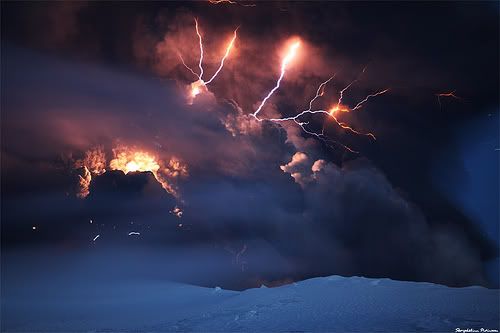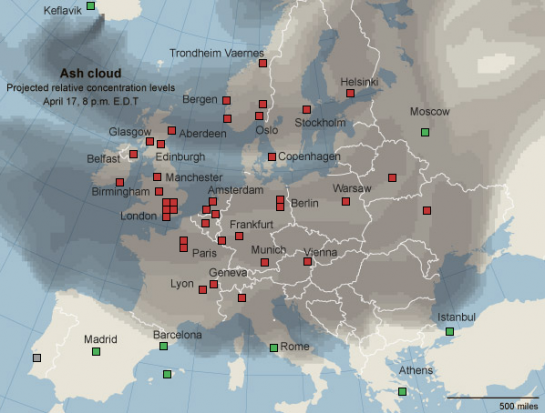I should be getting the last of my things sorted out right now, before getting on a train to Heathrow and then catching a flight to Cape Town for a 2 week observing run to study interstellar clouds with the SAAO. Unfortunately, it doesn't currently look like this is going to be happening quite as planned, courtesy of a large cloud of volcanic ash which is inconveniently sitting right above the UK. So while I'm waiting for 11:00 when I'm supposed to call South African Airways back, I figured I might as well write a bit about just what the hell is going on...
 The volcano Eyjafjallajökull (pronounced EYE-ah-FYAT-la-JO-kootl) erupted on Wednesday, spewing a huge plume of ash 8km into the atmosphere. Winds have since blown this ash into a huge cloud which is currently covering Northern Europe, almost in its entirety. Seemingly, while volcanoes normall tend to produce some amount of ash, it's been exacerbated in this case by Eyjafjallajökull being under a glacier. Hot magma meeting cold ice causes an immense burst of steam as the water is vapourised instantly. Unfortunately, so it would seem, that burst of steam has also served to aerosolise additional volcanic ash, meaning that Eyjafjallajökull is one messy beast. The ash itself, is essentially finely powdered volcanic rock. Silicates, mostly.
The volcano Eyjafjallajökull (pronounced EYE-ah-FYAT-la-JO-kootl) erupted on Wednesday, spewing a huge plume of ash 8km into the atmosphere. Winds have since blown this ash into a huge cloud which is currently covering Northern Europe, almost in its entirety. Seemingly, while volcanoes normall tend to produce some amount of ash, it's been exacerbated in this case by Eyjafjallajökull being under a glacier. Hot magma meeting cold ice causes an immense burst of steam as the water is vapourised instantly. Unfortunately, so it would seem, that burst of steam has also served to aerosolise additional volcanic ash, meaning that Eyjafjallajökull is one messy beast. The ash itself, is essentially finely powdered volcanic rock. Silicates, mostly.
The volcanic ash is stopping planes from flying because of the way jet engines work. Because jet engines suck in air, they'd also suck in ash, with the end result being a fine coating of volcanic glass on the inside of the jet turbines. Needless to say, this isn't good. Volcanic ash has been seen to cause aircraft engines to fail before, and while it's inconvenient to be stuck on the ground, it's far preferable to falling out of the sky!

Airports closed due to the ash cloud are shown in red.
So the end result is a huge closure of airports across Europe. Bloody typical. What happens when I'm due to go on my first observing run? "One of the largest disruptions in commercial aviation history" happens. That's what.
Perhaps the most interesting thing going on though, is that the skies have been eerily empty for days now. No jet trails at all. In fact, nothing. No clouds either, and a light haze near the horizon. I'd initially thought there might be lots of clouds, because of the sulfur compounds released by the volcano. Sulfurous aerosols (particularly sulfate and methyl sulfonate) have been shown to nucleate cloud particles, seeding clouds and causing rainfall. But there are no clouds at all. Perhaps all the water has already fallen from the air by the time it reaches this far inland.
EDIT-- Actually, there are indeed clouds now, so I may be wrong on some of this.
Despite all the furore that's normally associated with the matter, you have to wonder precisely what the environmental effect of all of this might be. European air traffic, it has to be said, contributes a large amount of carbon dioxide to the atmosphere. Much more on a daily basis than a volcanic eruption. What's more, sulfur compounds in the atmosphere will likely serve to increase Earth's albedo (albeit only fractionally). The albedo of a planet means how much light its atmosphere reflects. All of the sulfur in Venus's atmosphere gives it one of the highest albedos in the Solar system and is the reason why it reflects so much sunlight and shines so brightly in the evening sky. There's even the possibility that this volcano might help to cool the Earth's northern hemisphere slightly*. Volcanic eruptions in the past have managed to cool the average temperature at the Earth's surface by up to half a degree in the past century -- which may not sound like a lot, but on a global scale, that's rather significant!
Anyway, I'd better call the airline and find out what my travel plans are. I suspect the next few days are going to be no less worrisome than the last few.
*Specifically, sulfur compounds tend to sit in the stratosphere. This cools the lower atmosphere by reflecting away sunlight, but those sulfur compounds also absorb heat from Earth's surface causing the stratosphere to warm slightly. While this may be beneficial for glaciers and ice caps, the effect on the weather would remain to be seen...
Image credits:
"Cracks of Doom" - Skarpi's photostream
The Ash Cloud and Airport Shutdowns - Flowing Data
 The volcano Eyjafjallajökull (pronounced EYE-ah-FYAT-la-JO-kootl) erupted on Wednesday, spewing a huge plume of ash 8km into the atmosphere. Winds have since blown this ash into a huge cloud which is currently covering Northern Europe, almost in its entirety. Seemingly, while volcanoes normall tend to produce some amount of ash, it's been exacerbated in this case by Eyjafjallajökull being under a glacier. Hot magma meeting cold ice causes an immense burst of steam as the water is vapourised instantly. Unfortunately, so it would seem, that burst of steam has also served to aerosolise additional volcanic ash, meaning that Eyjafjallajökull is one messy beast. The ash itself, is essentially finely powdered volcanic rock. Silicates, mostly.
The volcano Eyjafjallajökull (pronounced EYE-ah-FYAT-la-JO-kootl) erupted on Wednesday, spewing a huge plume of ash 8km into the atmosphere. Winds have since blown this ash into a huge cloud which is currently covering Northern Europe, almost in its entirety. Seemingly, while volcanoes normall tend to produce some amount of ash, it's been exacerbated in this case by Eyjafjallajökull being under a glacier. Hot magma meeting cold ice causes an immense burst of steam as the water is vapourised instantly. Unfortunately, so it would seem, that burst of steam has also served to aerosolise additional volcanic ash, meaning that Eyjafjallajökull is one messy beast. The ash itself, is essentially finely powdered volcanic rock. Silicates, mostly.The volcanic ash is stopping planes from flying because of the way jet engines work. Because jet engines suck in air, they'd also suck in ash, with the end result being a fine coating of volcanic glass on the inside of the jet turbines. Needless to say, this isn't good. Volcanic ash has been seen to cause aircraft engines to fail before, and while it's inconvenient to be stuck on the ground, it's far preferable to falling out of the sky!

Airports closed due to the ash cloud are shown in red.
So the end result is a huge closure of airports across Europe. Bloody typical. What happens when I'm due to go on my first observing run? "One of the largest disruptions in commercial aviation history" happens. That's what.
Perhaps the most interesting thing going on though, is that the skies have been eerily empty for days now. No jet trails at all. In fact, nothing. No clouds either, and a light haze near the horizon. I'd initially thought there might be lots of clouds, because of the sulfur compounds released by the volcano. Sulfurous aerosols (particularly sulfate and methyl sulfonate) have been shown to nucleate cloud particles, seeding clouds and causing rainfall. But there are no clouds at all. Perhaps all the water has already fallen from the air by the time it reaches this far inland.
EDIT-- Actually, there are indeed clouds now, so I may be wrong on some of this.
Despite all the furore that's normally associated with the matter, you have to wonder precisely what the environmental effect of all of this might be. European air traffic, it has to be said, contributes a large amount of carbon dioxide to the atmosphere. Much more on a daily basis than a volcanic eruption. What's more, sulfur compounds in the atmosphere will likely serve to increase Earth's albedo (albeit only fractionally). The albedo of a planet means how much light its atmosphere reflects. All of the sulfur in Venus's atmosphere gives it one of the highest albedos in the Solar system and is the reason why it reflects so much sunlight and shines so brightly in the evening sky. There's even the possibility that this volcano might help to cool the Earth's northern hemisphere slightly*. Volcanic eruptions in the past have managed to cool the average temperature at the Earth's surface by up to half a degree in the past century -- which may not sound like a lot, but on a global scale, that's rather significant!
Anyway, I'd better call the airline and find out what my travel plans are. I suspect the next few days are going to be no less worrisome than the last few.
*Specifically, sulfur compounds tend to sit in the stratosphere. This cools the lower atmosphere by reflecting away sunlight, but those sulfur compounds also absorb heat from Earth's surface causing the stratosphere to warm slightly. While this may be beneficial for glaciers and ice caps, the effect on the weather would remain to be seen...
Image credits:
"Cracks of Doom" - Skarpi's photostream
The Ash Cloud and Airport Shutdowns - Flowing Data
No comments:
Post a Comment